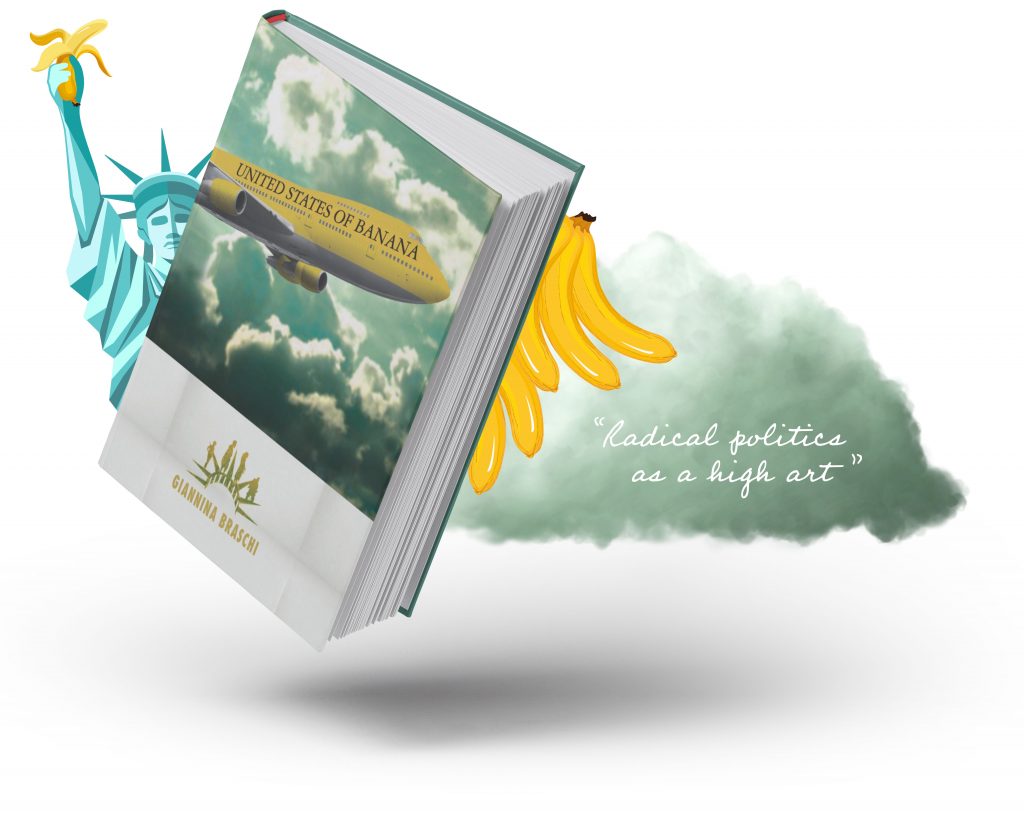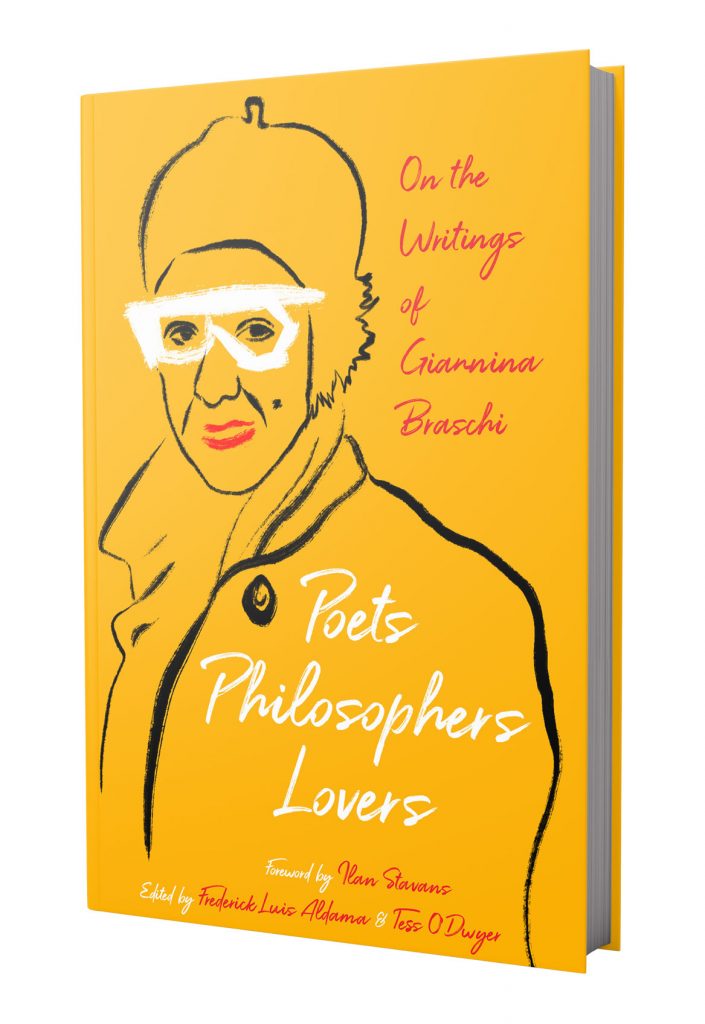Puerto Rican Philosophy Books.

Poetic Progress as Resistance to the Commodification of Culture in United States of Banana
Madelena Gonzalez
Staged in a surreal post-9/11 New York and Puerto Rico, United States of Banana is a politically charged metaphor for the fall of the US empire and the collapse of the World Trade Center as well as a plea for sub- ject minorities to free themselves from the yoke of domination by the majority, whether such domination be economic, linguistic, cultural, or ideological. Braschi’s sophisticated aesthetic challenges the banality of the contemporary clichés of global McCulture and allows her to rewrite radical politics as high art. Thanks to what she terms her “Hierarchy of Inspiration,” “the demon, the duende, the angel and the muses” (63), Bra- schi’s narrator affirms the unique status of the artist whose function is to reconnect with truth and authenticity through the aesthetic, emphasiz- ing the artist’s role as seer and visionary whose poetry can be the source of a powerful transformation of reality. She proposes a new common- wealth or “United Nations without nations” (USB 118), which eliminates the elements of power and authority that are sources of oppression in the hands of the majority. Ultimately, what is suggested by Braschi’s novel is the utopian potential of the aesthetic as an ethical alternative to the dom- inant ideology of the neoliberal imperative and the fabricated consensus of capitalism.
With the rise of globalization studies in academia, notably in the so- cial sciences and economics, postcolonialism and its reliance on alterity and hybridity is starting to seem out of sync with the generalized cultur- al homogenization that results from the global expansion of capital. For
some, the current state of affairs is merely a continuation of colonialism by other means, allowing for the continuation of the postcolonial par- adigm; for others the necessity for a “new cartography” is palpable and urgent (Hardt and Negri 92). Postcolonialism, as its name suggests, was constructed in relation to colonization, on the back of the disillusion- ment with the failure of nationalism, hence the fear of essentialism and the Enlightenment project that it evinces. However, the globalized era has ushered in new, more insidious and more ambivalent forms of economic imperialism as well as a new epoch of post-nationalism, which may be couched in the form of the reinvigorated internationalism of a traditional Marxist cast or be closer to Hardt and Negri’s utopian vision of “global citizenship” (92). Even if both phenomena are situated historically, nei- ther can be glibly assimilated to the postcolonial as we know it to date.
In the field of literary criticism and the study of fiction, there is a time lag in relation to this new state of affairs. The postcolonial label is still persistently and systematically applied to certain writers who are seen as representative of its main tropes, for both ethnic and aesthetic reasons, although a clear definition of the postcolonial aesthetic has yet to arise. The work of Braschi, a Puerto Rican living in New York, would seem to fulfil the necessary criteria of biculturalism, bilingualism, migrancy, hybridity that are required for gaining entry into the postcolonial canon. Indeed, the panel session dedicated to United States of Banana at the convention of the Modern Language Association in January 2013 had re- course to this familiar paradigm. Braschi, it would seem, inhabits a space that is hotly contested by both high postcolonial studies and the world book industry, which exists within the new paradigm of global culture or what Wallerstein and other analysts have classed as the world capi- talist system. Indeed, it is worth noting that United States of Banana is published by AmazonCrossing, the Internet giant’s publishing arm. This double interpellation affects her performance as a writer but also that of readers of her work. Her novel is seemingly ideally poised for analysis within existing critical parameters but obstinately refuses to conform to the protocols laid out for it.
Three different aspects of the novel seem particularly relevant to my hypothesis of a poetics of resistance. First, the return to form and style is a way of reasserting control over the novel as artefact. Second, the artist figure is seen as a “bad subject,” declining to occupy the role assigned her within globalization. Third, the emphasis is on the creative imagination as a source of agency and transformative power, both locked in battle with the hyperreal simulacrum of the technoverse and obliged to seek out a compromise with mimesis and rationality in order to reaffirm real emotion via the expression of an ethical universal….

One of the most comprehensive and critically engaging publications that covers the breadth and scope of Braschi’s literary production. . . . Perfectly aligns with Braschi’s literary proposals and aesthetics by providing a variety of critical voices and commentary on her work that help contextualize and further comprehend the important legacy of Braschi’s incomparable genius and craft.
CENTRO
(Puerto Rican Philosophy Books)
The recent volume Poets, Philosophers, Lovers: On the Writings of Giannina Braschi, edited by Frederick Luis Aldama and Tess O’Dwyer, has come to fill a major gap in the critical bibliography on Braschi’s work and life. . . . [It] is a comprehensive collection on the work that Giannina Braschi has been developing since the 1980s and, with rigorous and accessible texts, represents an essential resource for future Braschian studies, as well as diaspora literature in general.
Arizona Journal of Hispanic Cultural Studies
(Puerto Rican Philosophy Books)
Puerto Rican Philosophy Books and Essays
- Catastrophic Historicism (Idiom: Inventing Writing Theory) by Ronald Mendoza-de Jesús
- Colonial Debts (Una proposición modesta: Puerto Rico a prueba) by Rocío Zambrana
- Decolonization Models for America’s Last Colony: Puerto Rico by Ángel Collado Schwarz
- Estética del pensamiento III: La invención de sí mismo by Francisco José Ramos
- Geografía evolutiva, 1895 by Eugenio María de Hostos
- La educación científica de la mujer, Eugenio María de Hostos
- La Peregrinación de Bayoá, Eugenio María de Hostos
- Lecciones de derecho constitucional, Eugenio María de Hostos
- Moral Social, 1888 Eugenio María de Hostos
- Poets Philosophers Lovers: On the Writings of Giannina Braschi by Frederick Luis Aldama
- United States of Banana / Estados Unidos de Banana (Puerto Rican Philosophy of Liberation) by Giannina Braschi
- Yo-Yo Boing! (Socratic dialogues in Spanglish) by Giannina Braschi
Puerto Rican Philosophy Organizations/Resources
- La Casa de la Herencia Cultural Puertorriqueña
- Puerto Rican Studies Network (for Puerto Rican Philosophy books)
- Center for Puerto Rican Studies (for more on Puerto Rican philosophy books and literature)
- Caribbean Philosophical Association (including Puerto Rican philosophy books + other Spanish Caribbean philosophy books)
- Repeating Islands (news and commentary on Caribbean culture, literature, and the arts)
